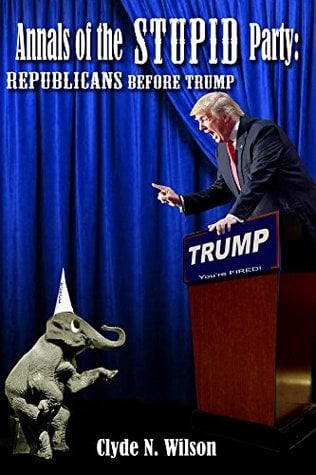When Donald Trump defeated Ted Cruz in the 2016 Indiana presidential primary, the race for the Republican Party nomination was over. The prize was Trump’s. The next day, House Speaker Paul Ryan announced that he was not yet ready to endorse the standard-bearer. George H.W. Bush, George W. Bush, and Jeb Bush quickly followed suit, adding that they would not endorse Trump, nor would they attend the GOP convention in Cleveland. The same was true of John McCain and Mitt Romney, even though the latter had sought out—and received—Trump’s endorsement for Romney’s 2012 presidential bid. In all, 26 percent of Republican Party elected officials nationwide refused to endorse Trump in a race against Hillary Rodham Clinton.
None of this was news to Clyde Wilson. The author describes himself as a “tiny wasp trying to sting through the thick elephant’s hide.” But he has been more than that. For the past half century, Wilson has been the most relentless and incisive critic the Grand Old Party has ever seen. To Wilson, the party, from the beginning, has always been a scam, a money-making vehicle, appealing for Middle American votes through wars, attacks on “big government,” and paeans to patriotism and traditional values. Wilson’s distaste for the GOP is historical: He has long shared M.E. Bradford’s contention that the Civil War forever wrecked the agrarian republic, ushering in the ongoing age of centralized rule and crony capitalism. That is only part of the story.
The GOP is more than a scam: It represents a monstrous betrayal of a long-suffering constituency. The key year was 1968. Four years earlier, the Republican elites dismissed the Barry Goldwater candidacy, standing aside as the Arizonian sustained a 44-state landslide defeat at the hands of Lyndon Johnson. In 1968 however, with the nation aflame and George Wallace running a spirited insurgency, the GOP, under Richard Nixon, saw an opening. Wilson has long claimed that it was Wallace who was solely responsible for the Republicans’ feint to the right. Either way, the party dominated presidential politics for the next two decades. And nothing happened. With busing, affirmative action, legalized abortion, immigration, multiculturalism, and, finally, the triumph of gay marriage, the country moved further left with each passing election.
Central to the GOP’s betrayal has been the Bush family. The failed presidency of George H.W. Bush gave us eight years of Bill Clinton. His son’s even more unpopular regime eased the way for Barack Obama’s presidency. An entire section of Wilson’s book is devoted to the presidency of Bush 43. No surprise here. Bush the Lesser represents everything Wilson mourns about his beloved homeland. A scion of Yankee carpetbaggers, Bush brought his shrill style of New England millenarianism to Texas and, later, the nation. It all ended in shambles: an invasion and failed occupation of Iraq, a global recession and an approval rating in the low 20’s. Bush, to Wilson, was just a “spoiled brat,” a possible war criminal, and yet another Republican who betrayed his base, in this case by shilling constantly for illegal-alien amnesty when the Republican electorate clearly wanted border security. During another broadside against Bush, Wilson laments that “my entire lifetime as a citizen has been nothing but a relentless series of defeats of my America by his America”—a cry that sums up the frustration of this entire volume.
Wilson’s condemnation of the GOP is thorough. In fairness, Nixon tried to alter the Supreme Court with the nominations of H. Clement Haynsworth and Harrold Carswell, while Ronald Reagan attempted the same with Robert Bork; all three men were rejected by Democratic-controlled Senates. Along the way, Wilson has praised certain Republicans: Charles Lindbergh, Sr., a fiscal hawk from Minnesota and father of the famed flying ace, plus such men as Pat Buchanan and Ron Paul, whose maverick candidacies paved the path for Donald Trump’s eventual triumph.
Wilson’s critique centers on Republican presidents and congresses too feckless to stem the unceasing wave of leftism. Outside Washington, however, the story is a different one. The GOP during the Obama years was a remarkably resourceful party. Over the past decade, Republicans have gained nearly 1,000 seats in state legislatures nationwide; they now control 33 such legislatures and no fewer than 37 state senates. Stupid or not, the party is poised to dominate American politics as at no other time in its history. Can any good yet come from it? Is a second constitutional convention in the offing?
Annals of the Stupid Party is more than a blistering critique of Republican ineptitude. Wilson is delivering one last two-by-four to the elephant: Donald Trump has taught you how to win again, by confronting such crucial issues as trade and immigration. By combining the Midwest with the South, he is building a new Electoral College majority for future victories. Will the Stupid Party learn from him? Before Trump’s inauguration, Republicans were bursting for confrontation with Russia, and John McCain was willing to risk a military showdown by declaring a no-fly zone in the Syrian skies. Trump has wisely resisted both policies. But these are only two examples of the challenges ahead of him. Time and time again, Donald Trump will need to be just as ruthless with Paul Ryan and Mitch McConnell as he was with Jeb Bush and Hillary Clinton. That may require even more resolve than serving as the leader of the “free world.”
[Annals of the Stupid Party: Republicans Before Trump, by Clyde N. Wilson (Columbia: Shotwell Publishing) 188 pp., $14.95]

Leave a Reply